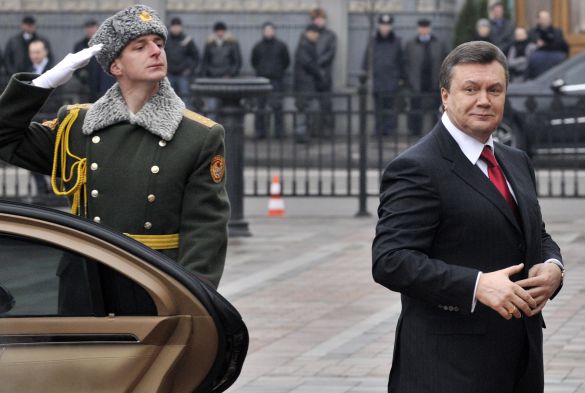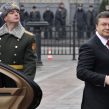
Can Ukraine Hold Free Elections Next Year?
Publication: Eurasia Daily Monitor Volume: 8 Issue: 191
By:

The October 11 sentencing of Yulia Tymoshenko to seven years imprisonment makes it impossible to hold free elections in one year’s time on October 31, 2012. The EU has already made its position plain: if opposition leaders are not able to stand, then the elections cannot be recognized by the Organization for Security and Cooperation in Europe (OSCE) as in accordance with “democratic” standards.
A second factor is the attitude of Ukrainian opposition leaders. Running second in popularity among opposition leaders, Front for Change leader Arseniy Yatseniuk would benefit the most from Tymoshenko not standing in the elections, but he nevertheless called upon the opposition to boycott the 2012 elections if some leaders could not stand (Ukrayinska Pravda, October 11).
An equally important area for the holding of a free election is the election law. A “Working Group on Election Law Improvement” was established by presidential decree on November 2, 2010, but has been mired in controversy ever since. Most incumbent Ukrainian administrations have changed election laws ahead of elections to shift the rules in their favor. The latest example was the last-minute changes to the date and law on local elections leading to widespread fraud in favor of the Party of Regions in the October 2010 local elections. The current draft would be the fourth change in Ukraine’s election law in two decades.
All major opposition parties believe the election law should be drafted through the parliamentary process – not by the presidential administration. EU Ambassador to Ukraine Jose Teixera pointed out: “There is not one European country in which the president defines the electoral system” (Kyiv Post, October 3).
The National Democratic Institute (NDI) and International Republican Institute (IRI) withdrew from the Working Group on March 17. NDI Ukraine head Kristina Wilfore believes the draft election law will reduce opportunities for “fair and equal competition” and is being drafted in a “non-inclusive, non-transparent and non-accountable” manner (Kyiv Post, October 7).
The opposition has not backed a return to a mixed proportional-majoritarian election law and supports maintaining the current proportional system but reforming it with open lists of deputies so that voters know who they are voting for in political parties. Ukraine used a mixed system in 1998 and 2002 and a proportional system in 2006 and 2007.
The Party of Regions supports a return to a mixed system because it would give it a simple majority or constitutional majority in the next parliament. Yatseniuk believes the draft law is aimed at receiving a constitutional majority “by unconstitutional means,” adding, “They want to do this by passing a law that would permit the falsification of the next parliamentary elections – in the same way as they falsified the local elections” (Interfax-Ukraine, October 5).
The proportional system used in 2006 and 2007 gave the Party of Regions a first place plurality of 31 percent to 34 percent, which, together with the Communist Party, gave it 40 percent of the seats. This could only lead to a parliamentary majority when the Socialist Party (SPU) defected to the Party of Regions in 2006 (giving them 55 percent of the seats), but not in 2007, when the SPU failed to enter parliament.
A projection by NDI-Ukraine for parliamentary seats under the existing proportional and proposed mixed election laws gives the Party of Regions 143 and 232 seats, respectively. Tymoshenko’s Batkivshchina (Fatherland) and Front for Change would receive fewer seats under the mixed system (87 and 38 respectively) than the current law (116 and 61). The majority of deputies elected in majoritarian districts would be officials and businessmen who would join a pro-presidential coalition.
On June 23, the Justice Ministry requested the Council of Europe’s Venice Commission and International Foundation Electoral Systems (IFES) to comment on the draft law; these were submitted in September. The Venice Commission is concerned about the absence of criteria for defining election boundaries, lack of clarity on challenging election results and transparency of the financial sponsoring of parties and candidates (www.venice.coe.it, September 14). Opposition parties have called for revising the manner in which the Central Election Commission (which was a major source of election fraud in 2004) and local election commissions are determined.
IFES criticism was stronger, noting the “uncertainty and distrust” that existed between the authorities and opposition and civil society (which will have grown following Tymoshenko’s sentencing). IFES stated: “Electoral systems can always be improved for the better, but given the lack of consensus in the country; the significant impact of the proposed changes on the political landscape; and relatively short timeline for implementing these changes, it is highly questionable whether it makes sense to change the system at the present time. While the newly proposed system may be a legitimate one, there is no major flaw in the current system that would require an immediate change without further discussion” (www.ifes.org, September 26).
In addition, IFES was critical of the elimination of blocs, increasing the threshold from 3 percent to 5 percent (the 1998 and 2002 elections used 4 percent) and removing the voting choice “Against All.” IFES added: “The draft law allows a court to ban a publication or revoke the license of a broadcaster for the duration of the election campaign if the media organization commits multiple or a single ‘gross violation’ of the law. This provision is vague, given the seriousness of the sanction contemplated.”
In September in Kharkiv, three opposition channels were taken off the air in controversial circumstances. The channels are co-owned by former Kharkiv oblast council head Arsen Avakov, a member of Batkivshchina, who won the 2010 local elections but was fraudulently denied his seat, which was given to pro-presidential candidate, Mykhailo Dobkin (Kyiv Post, October 7).
The removal of the right of blocs to contest elections is aimed against the Bloc of Yulia Tymoshenko (BYuT). The removal of the right to vote “Against All” would decrease the voter turnout as voters who are disillusioned with all politicians – a group that is growing in number – would not vote. Ironically, in the 2010 elections, President Viktor Yushchenko called on Ukrainians to vote “Against All” to reduce votes for Tymoshenko.
The Party of Regions has four reasons to seek parliamentary majorities. First, it grows out of its political culture, which seeks to monopolize power politically and economically. Party of Regions parliamentary faction leader Oleksandr Yefremov said on the day of the Tymoshenko verdict that his party had no competitors in Ukraine (Ukrayinska Pravda, October 11). Second, the ruling party believes parliament should facilitate Yanukovych’s re-election in 2015. Third, the governing authorities believe the parliament should be a rubber stamp institution in support of the president and the Nikolai Azarov government. Finally, the proposed constitutional reforms would transform Ukraine from a semi-presidential to a fully presidential system and make Russian a second state language.




